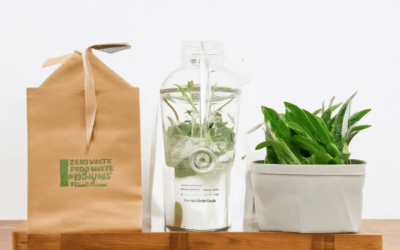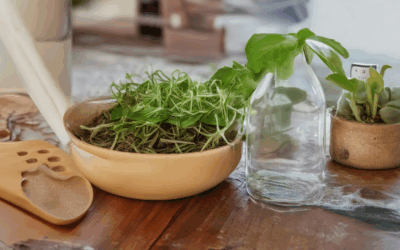Are you eager to adopt a zero-waste lifestyle but worried it might break the bank? The good news is that living a zero-waste lifestyle doesn’t have to drain your savings. With careful planning and creative strategies, anyone can embrace sustainability without overspending. In this article, we’ll explore practical tips, innovative ideas, and budget-friendly approaches to help you transition to a zero-waste routine. By understanding zero waste budgeting kya hai and discovering how to go zero waste on a budget, you’ll learn how to reduce waste while staying within your financial limits. Whether it’s through sustainable shopping hacks, eco-friendly cleaning solutions, or meal planning strategies, we’ll provide actionable steps to make zero-waste living affordable and achievable. Join us as we dive into the world of budget-friendly zero waste living and unlock the secrets to a greener, more economical lifestyle.
Key Takeaways
- Shop Secondhand: Buy gently used items to save money and reduce waste from fast fashion.
- Make Eco-Friendly Products at Home: Create your own products like cloth menstrual pads or beeswax wraps for cost-effective sustainability.
- Reuse Over Buying New: Transform existing items into useful tools to cut down on waste.
- Shop Seasonally & in Bulk: Save money and reduce food waste by buying in bulk during peak seasons.
- Sustainable Habits: Use reusable items and digital receipts to minimize waste and stay eco-friendly.
- Local Initiatives: Join community efforts to support sustainability and environmental health.

How Can You Live a Zero-Waste Lifestyle on a Budget?
Eco Planeta Verde helps individuals adopt sustainable living practices without compromising their budget. By implementing thoughtful strategies, you can significantly reduce waste while staying within financial limits.
1. Invest in Reusable Products
Purchase durable and multi-use items to minimize single-use waste. For instance, invest in:
- Cloth menstrual pads instead of disposable ones
- Glassware or stainless steel containers
- Reusable cloth napkins
- Insulated water bottles
This approach saves money in the long run and reduces plastic waste.
2. Buy in Bulk
Shopping in bulk allows you to purchase larger quantities, often at lower prices per unit. Look for:
- Bulk grains and legumes
- Refillable cleaning products
- Large packs of toilet paper
- Fresh produce in bulk
Many local stores and online platforms offer affordable bulk options.
3. Utilize DIY Solutions
Create your own household products to cut costs and reduce packaging waste. Try making:
- Natural cleaning solutions (e.g., vinegar and baking soda)
- Personal care products (e.g., homemade toothpaste)
- cloth wipes instead of paper towels
These methods are cost-effective and eco-friendly.
4. Join Community Support Networks
Participate in zero-waste groups or local initiatives to access discounted goods and share resources. Many communities offer:
- Shared bulk purchasing programs
- Local farmers’ markets
- Second-hand exchanges
Engaging with these networks can help you find affordable, sustainable alternatives.
5. Reduce Food Waste
Plan meals carefully to minimize food waste. Use apps like Eco Planeta Verde’s Food Waste Guide to learn how to store and use ingredients effectively. Consider:
- Buying only what you need
- Storing food properly
- Using leftovers creatively
Reduction of food waste directly impacts your budget and the environment.
6. Adopt Sustainable Habits
Small changes in daily routines can lead to significant waste reduction. Try:
- Using public transportation or cycling
- Carrying reusable bags
- Switching to digital receipts
- Composting kitchen scraps
These habits are easy to maintain and contribute to a greener lifestyle.
Eco Planeta Verde offers detailed guides and resources to help you get started. Visit our Zero-Waste Living Hub for more tips and inspiration.
How Can You Live a Zero-Waste Lifestyle on a Budget?
Eco Planeta Verde helps individuals adopt sustainable living practices without compromising their budget. By implementing thoughtful strategies, you can significantly reduce waste while staying within financial limits.
1. Invest in Reusable Products
Purchase durable and multi-use items to minimize single-use waste. For instance, invest in:
- Cloth menstrual pads instead of disposable ones
- Glassware or stainless steel containers
- Reusable cloth napkins
- Insulated water bottles
This approach saves money in the long run and reduces plastic waste.
2. Buy in Bulk
Shopping in bulk allows you to purchase larger quantities, often at lower prices per unit. Look for:
- Bulk grains and legumes
- Refillable cleaning products
- Large packs of toilet paper
- Fresh produce in bulk
Many local stores and online platforms offer affordable bulk options.
3. Utilize DIY Solutions
Create your own household products to cut costs and reduce packaging waste. Try making:
- Natural cleaning solutions (e.g., vinegar and baking soda)
- Personal care products (e.g., homemade toothpaste)
- cloth wipes instead of paper towels
These methods are cost-effective and eco-friendly.
4. Join Community Support Networks
Participate in zero-waste groups or local initiatives to access discounted goods and share resources. Many communities offer:
- Shared bulk purchasing programs
- Local farmers’ markets
- Second-hand exchanges
Engaging with these networks can help you find affordable, sustainable alternatives.
5. Reduce Food Waste
Plan meals carefully to minimize food waste. Use apps like Eco Planeta Verde’s Food Waste Guide to learn how to store and use ingredients effectively. Consider:
- Buying only what you need
- Storing food properly
- Using leftovers creatively
Reduction of food waste directly impacts your budget and the environment.
6. Adopt Sustainable Habits
Small changes in daily routines can lead to significant waste reduction. Try:
- Using public transportation or cycling
- Carrying reusable bags
- Switching to digital receipts
- Composting kitchen scraps
These habits are easy to maintain and contribute to a greener lifestyle.
Eco Planeta Verde offers detailed guides and resources to help you get started. Visit our Zero-Waste Living Hub for more tips and inspiration.

How Can You Afford a Zero-Waste Lifestyle?
A zero-waste lifestyle focuses on minimizing waste generation and repurposing materials to reduce environmental impact. While it may seem daunting, achieving this lifestyle doesn’t have to break the bank. Here are some practical tips to help you get started without spending too much:
1. Reduce Food Waste
Plan meals carefully to minimize food waste. Use apps like Eco Planeta Verde’s food waste app to track and reduce your food waste. Store leftovers properly and use them creatively in meals throughout the week. Buying locally and in-season ensures freshness and reduces packaging waste.
2. Shop Smartly
Choose stores that sell bulk goods and refillable containers. Many stores now offer bulk purchasing options for essentials like grains, nuts, and cleaning supplies. Bring your own containers to reduce plastic use and save money.
3. Make Your Own Products
DIY household products can save money and reduce waste. For example, make your own cloth menstrual pads or reusable dishcloths. These items are affordable to make and last much longer than disposable alternatives.
4. Compost at Home
Start a compost pile to turn kitchen scraps into nutrient-rich soil. Use this guide to learn how to begin composting at home. Not only does it reduce waste, but it also provides valuable nutrients for your garden.
5. Engage with Your Community
Join local zero-waste groups or participate in community clean-up initiatives. Many cities have programs to help reduce waste and promote sustainability. Sharing resources and knowledge can make the transition easier and more enjoyable.
6. Prioritize Quality Over Quantity
Invest in durable, high-quality products that last longer, reducing the need for frequent replacements. Visit our product guide to find eco-friendly options that fit your budget.
7. Reduce Packaging
Many stores allow you to bring your own containers for bulk purchases, which saves money and reduces packaging waste. Use local businesses that emphasize sustainability to further minimize your environmental footprint.
8. Utilize Digital Resources
Eco Planeta Verde offers free digital resources to help you adopt a zero-waste lifestyle. From recipe ideas to DIY projects, these tools can guide you toward more sustainable habits without additional costs.
By implementing these strategies, you can enjoy a zero-waste lifestyle that’s both affordable and environmentally beneficial. Remember, small changes can lead to big impacts, and every step you take brings you closer to a more sustainable world.

How to Achieve a Zero-Waste Lifestyle Without Breaking the Bank
Adopting a zero-waste lifestyle doesn’t have to drain your savings. With thoughtful strategies and smart shopping habits, you can enjoy an eco-friendly lifestyle while staying within budget.
1. Shop Secondhand
Buying secondhand reduces waste and saves money. Explore local thrift stores, flea markets, or online platforms like ThredUp or Poshmark to find gently used items. This approach not only lowers costs but also minimizes the environmental impact of fast fashion.
2. Make Eco-Friendly Products at Home
Creating your own products can be both fun and cost-effective. Try making items like:
- Cloth menstrual pads (a sustainable alternative to disposable pads)
- Beeswax wraps for food storage
- Reusable cloth wipes instead of paper ones
3. Prioritize Reuse Over Buying New
Before purchasing something new, think about how you can repurpose items you already have. For example, turn old jars into food storage containers or transform cardboard boxes into organizers.
4. Shop Seasonally and in Bulk
Buying fruits, vegetables, and grains in bulk during their peak season can save money and reduce waste. Plan meals around what’s in season to minimize spoilage and avoid impulse buying.
5. Invest in Sustainable Habits
Small changes can make a big difference. Use reusable containers for leftovers, bring your own reusable water bottle, and opt for digital receipts to avoid unnecessary paper waste.
6. Engage in Local Initiatives
Many communities host free workshops or events on sustainability. Check out local zero-waste groups or participate in clean-up drives to contribute to a greener environment.
Eco Planeta Verde encourages everyone to take small steps toward sustainability. By shopping wisely, reusing items, and embracing eco-friendly habits, you can achieve a zero-waste lifestyle without spending a fortune. Remember, every little effort counts toward a healthier planet!
Learn more about reducing food waste and discover additional tips to live sustainably on our website.
What Budget-Friendly Tips Can Help You Transition to a Zero-Waste Lifestyle?
Adopting a zero-waste lifestyle doesn’t have to break the bank. Here are some practical tips to help you get started without spending a fortune:
- Meal Planning:** Plan meals in advance to reduce food waste. This helps you shop smarter and use ingredients efficiently.
- Reusable Products:** Invest in high-quality, durable items like reusable containers, cloth napkins, and water bottles to minimize single-use waste.
- Diy Cleaning Solutions:** Make your own cleaning products using simple ingredients like vinegar and baking soda. This saves money and reduces plastic waste.
- Second-Hand Shopping:** Shop at thrift stores or buy second-hand items to reduce waste and save money on household goods.
- Local Programs:** Look for community initiatives or local markets that offer bulk purchasing options or surplus food opportunities.
- Reduce Packaging:** Opt for products with minimal packaging or bring your own containers to stores for refills.
- Compost:** Start composting kitchen scraps to create nutrient-rich soil and reduce landfill waste.
- Participate in Zero-Waste Groups:** Join online communities or local groups to share tips and find affordable zero-waste alternatives.
Eco Planeta Verde offers valuable resources and guides to help you adopt greener habits and make mindful decisions for a sustainable lifestyle. Explore their blog and guides for more tips and inspiration to reduce waste effectively.
For more information on sustainable living and reducing waste, visit our sustainable living section or check out our waste reduction tips .

Practical Tips for a Zero-Waste Lifestyle on a Budget
Adopting a zero-waste lifestyle doesn’t have to break the bank. Here are some budget-friendly tips to help you get started:
- Reuse and Repurpose Items: Before buying new products, think about how you can reuse what you already have. For example, old glass jars can become storage containers, and worn-out cotton cloths can be used as cleaning rags or cloth napkins.
- Shop Smart: Look for second-hand goods, bulk buys, and local markets where you can find affordable, high-quality items. Stores like Thrift Store often have great deals on eco-friendly products.
- Reduce Waste in Daily Habits: Small changes can make a big difference. Use reusable water bottles, bring your own containers for takeout, and opt for digital receipts instead of paper ones to minimize waste.
- Compost at Home: Save kitchen scraps and yard waste in a compost bin. Not only does this reduce landfill waste, but it also provides nutrient-rich soil for your garden.
- Cut Back on Single-Use Items: Reduce your reliance on items like plastic wrap, disposable gloves, and paper towels. Invest in reusable alternatives to save money and reduce waste.
- DIY Solutions: Create your own household products, such as natural cleaning sprays or beeswax wraps, to save money and avoid single-use packaging.
- Engage with Your Community: Join local zero-waste groups or participate in swap events where you can trade items with others. This not only helps you find freebies but also supports a sustainable community.
By incorporating these tips into your daily life, you can easily transition to a zero-waste lifestyle without spending a fortune. Remember, sustainability starts at home, and small changes can lead to big impacts!




0 Comments